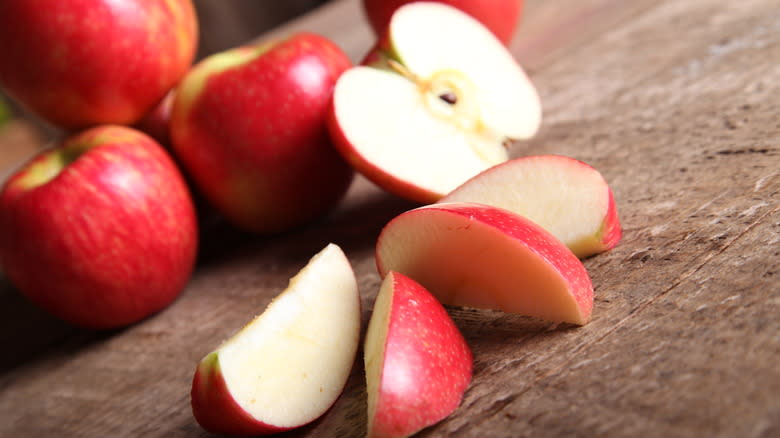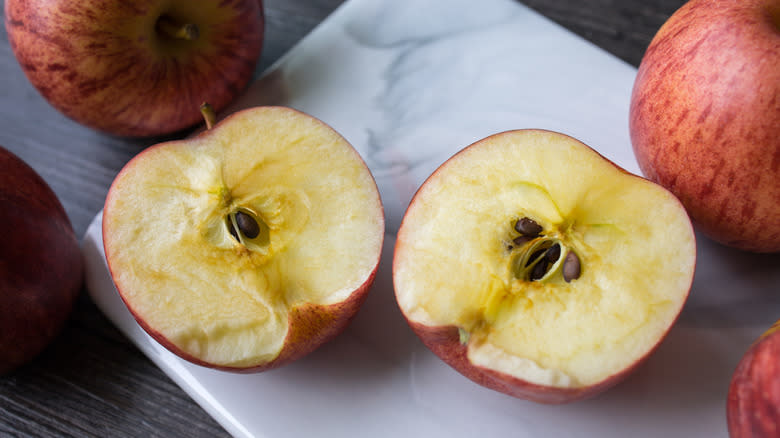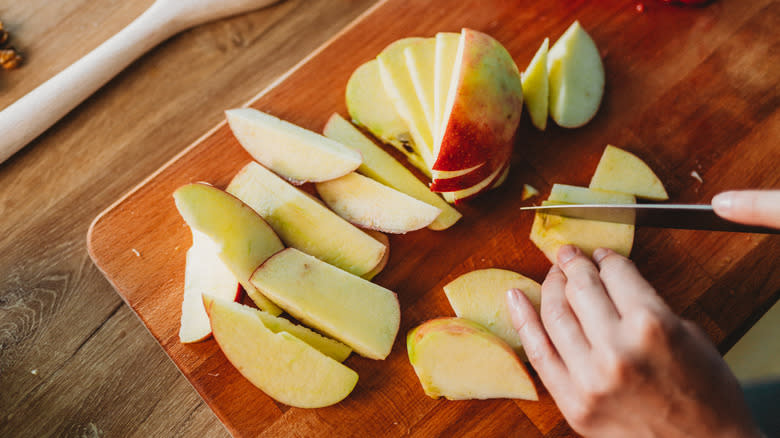Use Honey Water To Prevent Your Apples From Browning

We may receive a commission on purchases made from links.
Sliced apples are the perfect healthy and easy snack for kids and adults alike -- serve them with caramel or peanut butter and they're sure to disappear fast. But if apple slices sit for too long, they often go uneaten thanks to the unappealing browning that happens to apples after being cut. Browned apples are perfectly safe to eat, but many people shy away from them since they don't look particularly appetizing.
Lemon juice is often used as a quick solution to prevent browning, but it can leave a sour flavor on the fruit that many folks, especially youngsters, find disagreeable. To keep your cut fruit from browning without lemon juice, use honey instead for a sweeter taste. It might seem like a curious extra step for preserving a quick snack but it's worth it when you see how long your apples stay bright white and crisp.
Using honey water is quick and easy: After slicing your apples, toss them in a bowl of water with a couple of spoonfuls of honey and let them soak for just a few minutes. Your apples should stay fresh for several hours whether they're sitting in a lunch box or on a party platter.
Read more: 12 Vegetables And Fruits That Used To Look Very Different
Why Do Sliced Apples Turn Brown?

There's science behind this simple trick to keep your apples tasty and bright. Applesand other fruits and veggies such as pears, avocados, and potatoes turn brown after being cut open because of oxidation. When apples are cut and their flesh is exposed to oxygen, an enzyme called polyphenol oxidase (PPO) breaks down colorless chemicals called polyphenols, turning them into brown-colored chemicals. A peptide compound in honey helps neutralize PPO which can stop the apples from browning, keeping them fresh and looking delectable on your fruit tray or in your kids' lunches.
People typically try to prevent the brown color and mushy texture that results from enzymatic browning. If the honey-water hack isn't speaking to you, you could go in a different direction and soak sliced apples in salt water instead. Salt is a preservative so it'll keep your apples looking fresh long after they're cut. If you want to try salt water, don't let your apple slices soak for very long, and make sure to rinse them with water after soaking or the slices could taste salty. Saltwater is a proven preservative, but honey water might add a better taste to your apples.
For another sweet-tasting option, try soaking apple slices in lemon-lime soda for a sweet, more neutral taste. There's also a creative rubber band hack that will keep your apples from turning brown which involves cutting the apple and holding it together with a rubber band to slow oxidation.
Other Ways To Keep Apples From Turning Brown

Or maybe you would prefer to avoid the possibility of food waste altogether and are interested in trying apple varieties that are promoted as staying fresh after being sliced. That's understandable -- browned apple slices are thrown out so often that food scientists have developed a genetically modified non-browning apple called the Arctic apple. Arctic apple varieties, developed by Okanagan Specialty Fruits in Canada, don't contain the PPO enzyme responsible for enzymatic browning. The U.S. Food and Drug Administration has approved Arctic apples as safe for human consumption and you can currently buy them from select grocery stores. If Arctic apples aren't available or desirable to you, Opal apples are non-GMO apples that are so slow to brown, they are often considered a naturally non-browning type of apple.
Other better-known and easier-to-find apples that are slow to turn brown include Cortland, Empire, and Pink Lady; Honeycrisp will go brown more quickly, whereas Fuji, Golden Delicious, and McIntosh apples can seem to go brown almost as soon as the air hits them.
If searching for specific apple varieties sounds too time-consuming, don't bother memorizing which varieties quickly go brown when sliced and which don't, and instead just remember the much easier hack of putting any kind of apple slice in honey water to keep them white and appetizing.
Read the original article on Daily Meal.

